Πηλούσιον
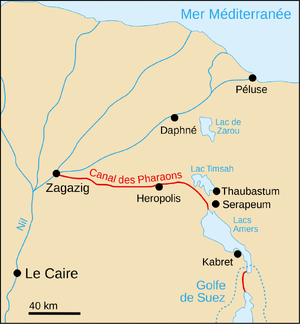
Νείλος Ποταμός (εκβολές)
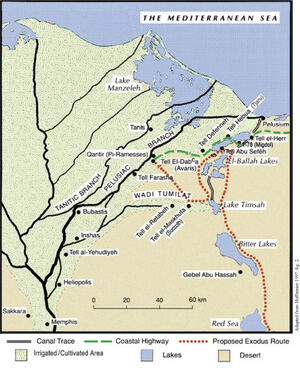
Νείλος Ποταμός (εκβολές)
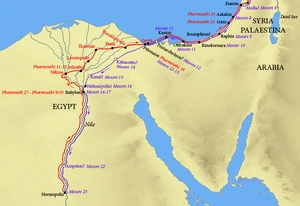
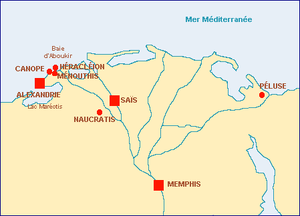
Ρακώτιδα Μενουθίς Θώνις Κάνωπος
Σάις Ναύκρατις Μέμφις Πηλούσιο
Μαρεώτιδα Λίμνη
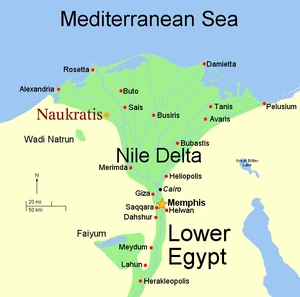
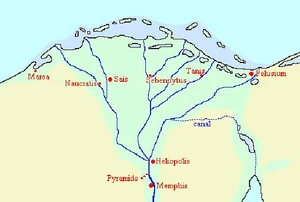
- Ιστορική πόλη της Κάτω Αιγύπτου.
Ετυμολογία[]
Το όνομα "Πηλούσιο" σχετίζεται ετυμολογικά με την λέξη "[[]]".
Γεωγραφία[]
| της Αιγύπτου
|
|---|
| Κάτω Αίγυπτος
|
|
| Μέση Αίγυπτος
|
|
| Άνω Αίγυπτος
|
|
Βρίσκεται στην Κάτω Αίγυπτο.
Pelusium lay between the seaboard and the marshes of the Nile Delta, about two-and-a-half miles from the sea.
The port was choked by sand as early as the first century BC, and the coastline has now advanced far beyond its ancient limits that the city, even in the third century AD, was at least four miles from the Mediterranean.
Pelusium stood as a border-fortress, a place of great strength, on the frontier, protecting Egypt as regards to Syria and the sea.
Thus, from its position, it was directly exposed to attack by any invaders of Egypt; it was often besieged, and several important battles were fought around its walls.
Ίδρυση[]
Άγνωστη η χρονολογία της ίδρυσής της.
Ιστορία[]
The principal product of the neighbouring lands was flax, and the linum Pelusiacum (Pliny's Natural History xix. 1. s. 3) was both abundant and of a very fine quality. Pelusium was also known for being an early producer of beer, known as the Pelusian drink.
Αναφορά στον Ηρόδοτο:
- "[2.17.3] ὁ γὰρ δὴ Νεῖλος ἀρξάμενος ἀπὸ τῶν Καταδούπων ῥέει μέσην Αἴγυπτον σχίζων ἐς θάλασσαν. μέχρι μέν νυν Κερκασώρου πόλιος ῥέει εἷς ἐὼν ὁ Νεῖλος, τὸ δὲ ἀπὸ ταύτης τῆς πόλιος σχίζεται τριφασίας ὁδούς. [2.17.4] καὶ ἡ μὲν πρὸς ἠῶ τρέπεται, τὸ καλέεται Πηλούσιον στόμα, ἡ δὲ ἑτέρη τῶν ὁδῶν πρὸς ἑσπέρην ἔχει· τοῦτο δὲ Κανωβικὸν στόμα κέκληται. ἡ δὲ δὴ ἰθέα τῶν ὁδῶν τῷ Νείλῳ ἐστὶ ἥδε· ἄνωθεν φερόμενος ἐς τὸ ὀξὺ τοῦ Δέλτα ἀπικνέεται, τὸ δὲ ἀπὸ τούτου σχίζων μέσον τὸ Δέλτα ἐς θάλασσαν ἐξίει, οὔτε ἐλαχίστην μοῖραν τοῦ ὕδατος παρεχόμενος ταύτῃ οὔτε ἥκιστα ὀνομαστήν, τὸ καλέεται Σεβεννυτικὸν στόμα. "
Αναφέρεται από τον Διονύσιο τον Περιηγητή Dionysius Periegetes
The following are the most notable events in the history of Pelusium :
Sennacherib, king of Assyria, 720-715 BC, in the reign of Sethos the Aethiopian (25th dynasty) advanced from Kingdom of Judah upon Pelusium, but retired without fighting from before its walls (Isaiah, xxxi. 8; Herodotus ii. 141 ; Strabo xiii. p. 604). His retreat was ascribed to the favor of Hephaestos towards Sethos, his priest. In the night, while the Assyrians slept, a host of field-mice gnawed the bow-strings and shield-straps of the Assyrians, who fled, and many of them were slain in their flight by the Egyptians. Herodotus saw in the temple of Hephaestos at Memphis, a record of this victory of the Egyptians, viz. a statue of Sethos holding a mouse in his hand. The story probably rests on the fact that in the symbolism of Egypt the mouse implied destruction. (Compare Horapolis Hieroglyph. i. 50; Claudius Aelianus, De Natura Animalium vi. 41.)
The decisive battle which transferred the throne of the Pharaohs to Cambyses II, king of the Persians, was fought near Pelusium in 525 BC. The fields around were strewn with the bones of the combatants when Herodotus visited. He noted that the skulls of the Egyptians were distinguishable from those of the Persians by their superior hardness, a fact confirmed he said by the mummies. He ascribed this to the Egyptians' shaving their heads from infancy, and to the Persians covering them up with folds of cloth or linen. (Herodotus ii. 10, seq.); however, according to legend, Pelusium fell without a fight, by the simple expedient of having the invading army drive cats (sacred to the local goddess Bast) before them. As Cambyses advanced at once to Memphis, Pelusium probably surrendered itself immediately after the battle. (Polyaen. Stratag. vii. 9.)
In 373 BC, Pharnabazus, satrap of Phrygia, and Iphicrates, the commander of the Athenian armament, appeared before Pelusium, but retired without attacking it, Nectanebo I, king of Egypt, having added to its former defences by laying the neighboring lands under water, and blocking up the navigable channels of the Nile by embankments. (Diodorus Siculus xv. 42; Cornelius Nepos, Iphicrates c. 5.)
Pelusium was attacked and taken by the Persians, 343 BC (344 BC ?). The city contained at the time a garrison of 5,000 Greek mercenaries under the command of Philophron. At first, owing to the rashness of the Thebans in the Persian service, the defenders had the advantage. But the Egyptian king Nectanebo II hastily venturing on a pitched battle, his troops were cut to pieces, and Pelusium surrendered to the Theban general Lacrates on honorable conditions. (Diodorus Siculus xvi. 43.)
In 333 BC, Pelusium opened its gates to Alexander the Great, who placed a garrison in it under the command of one of those officers entitled Companions of the King. (Arrian, Exp. Alex. iii. 1, seq.; Quintus Curtius iv. 33.)
In 173 BC, Antiochus Epiphanes utterly defeated the troops of Ptolemy Philometor under the walls of Pelusium, which he took and retained after he had retired from the rest of Egypt. (Polybius Legat. § 82; Hieronym. in Daniel. xi.) On the fall of the Syrian kingdom, however, if not earlier, Pelusium had been restored to the Ptolemies.
In 55 BC, again belonging to Egypt, Mark Antony, as cavalry general to the Roman proconsul Gabinius, defeated the Egyptian army, and made himself master of the city. Ptolemy Auletes, in whose behalf the Romans invaded Egypt at this time, wished to put the Pelusians to the sword; but his intention was thwarted by Mark Anthony. (Plut. Anton. c. 3; Valerius Max. ix. 1.)
In 48 BC, Pompey was murdered in Pelusium.
In 30 BC, more than half a year after his victory at Actium, Augustus appeared before Pelusium, and was admitted by its governor Seleucus within its walls.
In 501 AD, Pelusium suffered greatly from the Persian invasion of Egypt (Eutychius, Annal.).
In 541 AD, the Plague of Justinian was first reported and began to spread across the Byzantine Empire.
In 639, Pelusium offered a protracted, though, in the end, an ineffectual resistance to the arms of Amr ibn al-As. As on former occasions, the surrender of the key of the Delta was nearly equivalent to the subjugation of Egypt itself.
In 749, Pelusium was raided by the Bashmuric Copts.
In ca. 870, Pelusium is mentioned as a major port in the trade network of the Radhanite merchants.
In 1118, Baldwin I of Jerusalem razed the city to the ground, but died shortly afterwards of food poisoning after eating a plateful of the local fish.
The khalifs who ruled Pelusium following the Crusades, however, generally neglected the harbors, and from that period Pelusium, which had long been on the decline, almost disappeared from history.
Υποσημειώσεις[]
Εσωτερική Αρθρογραφία[]
Βιβλιογραφία[]
Ιστογραφία[]
|
Αν και θα βρείτε εξακριβωμένες πληροφορίες "Οι πληροφορίες αυτές μπορεί πρόσφατα Πρέπει να λάβετε υπ' όψη ότι Επίσης, |
- Μην κάνετε χρήση του περιεχομένου της παρούσας εγκυκλοπαίδειας
αν διαφωνείτε με όσα αναγράφονται σε αυτήν
- Όχι, στις διαφημίσεις που περιέχουν απαράδεκτο περιεχόμενο (άσεμνες εικόνες, ροζ αγγελίες κλπ.)
